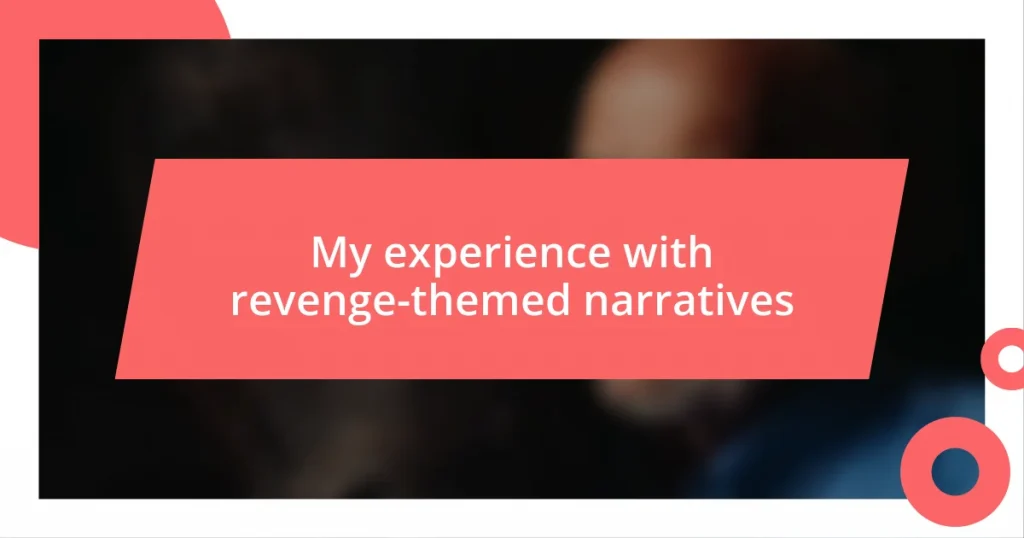Key takeaways:
- Revenge-themed narratives evoke complex emotions, challenging our understanding of justice, morality, and the consequences of retribution.
- Key elements of revenge plots include moral ambiguity, character transformation, and the interplay between allies and enemies, prompting introspection about personal ethics.
- These stories reveal that seeking revenge often leads to a cycle of suffering and highlights the importance of empathy, understanding, and the potential for healing through forgiveness.
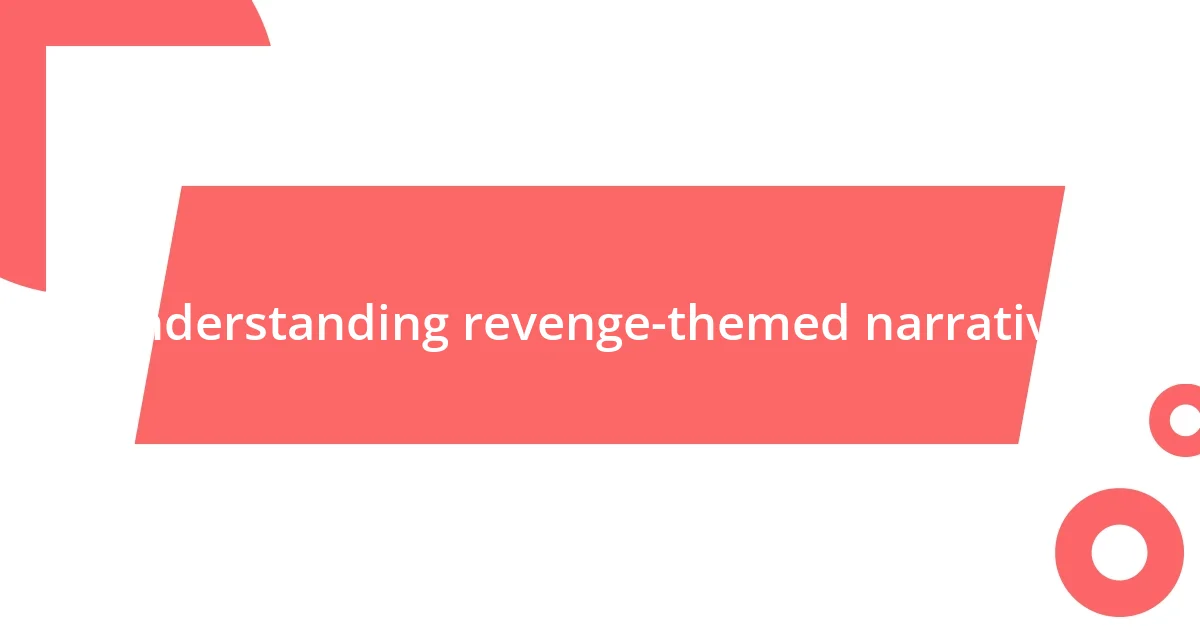
Understanding revenge-themed narratives
Revenge-themed narratives often delve deep into the complexities of human emotion. I remember watching a movie where the protagonist was driven by a desire to settle scores after a profound betrayal. It made me think, how far would I go if pushed to the edge? Such stories often tap into our primal instincts, evoking a mixture of empathy and revulsion.
These narratives can serve as a mirror, reflecting our innermost struggles with justice and morality. I once discussed a revenge novel with friends, and we found ourselves debating its ethics long after we turned the last page. It’s fascinating how these tales force us to question our understanding of right and wrong. Can revenge ever truly be justified, or does it ultimately lead to a cycle of pain?
At their core, revenge-themed stories highlight the fragile balance between suffering and redemption. There was a time when I felt wronged and found myself fantasizing about retribution; yet, I realized that those thoughts only fueled my anguish. These narratives remind us that revenge might provide fleeting satisfaction, but often, it leaves a trail of collateral damage that we didn’t anticipate.
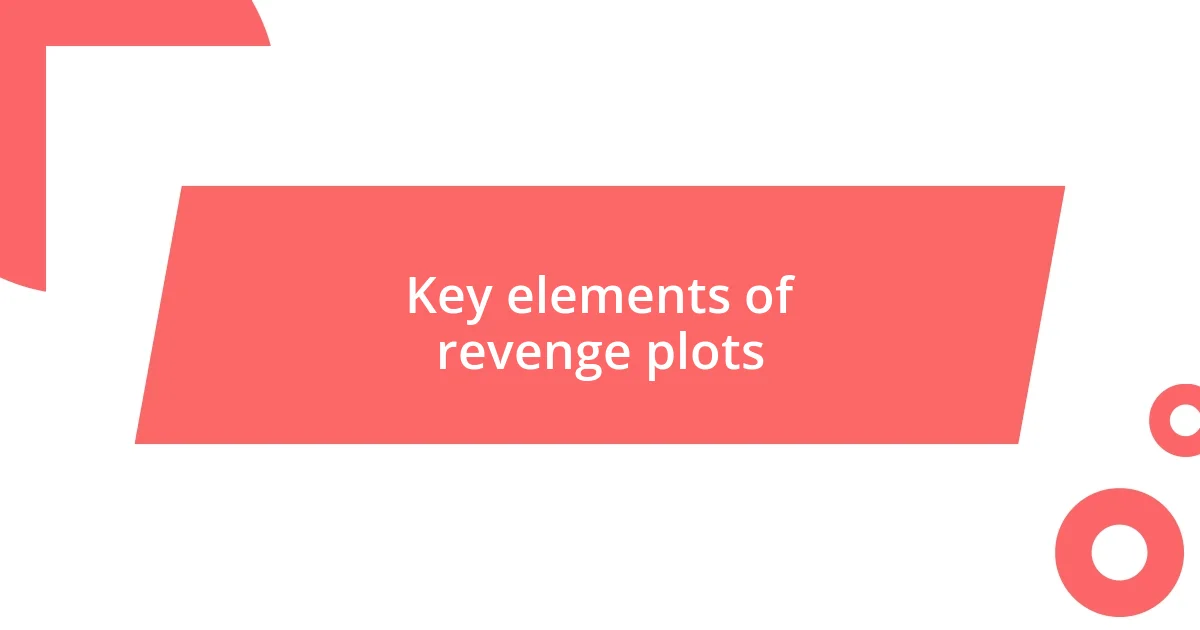
Key elements of revenge plots
Revenge plots often revolve around a few key elements that amplify the emotional stakes. One essential aspect is the inciting incident, the moment that triggers the desire for revenge. I remember reading about a character who lost everything due to betrayal; their pain resonated with me deeply, reflecting my own experiences of feeling wronged in life. This incident creates a personal connection, compelling viewers or readers to invest emotionally in the outcome.
Here are some key elements commonly found in revenge stories:
- The protagonist’s transformation: The gradual change they undergo as they pursue revenge can be both captivating and unsettling.
- Moral ambiguity: Often, the line between right and wrong blurs, inviting the audience to struggle with their own ethical judgments.
- Allies and enemies: The dynamics of relationships play a crucial role. Who stands by the protagonist, and who becomes the target?
- Consequences: The aftermath of revenge typically explores themes of regret and the unexpected fallout, reminding us that actions have repercussions.
- A defining moment of realization: This often leads to a pivotal choice, encouraging the audience to reflect on the nature of forgiveness versus vengeance.
As I read about these elements, I consistently find myself grappling with the balance of human emotions involved. They draw me in and make me ponder: what would I do in a similar situation? The richness of these stories lies in the exploration of those raw feelings that echo our own life’s complexity.
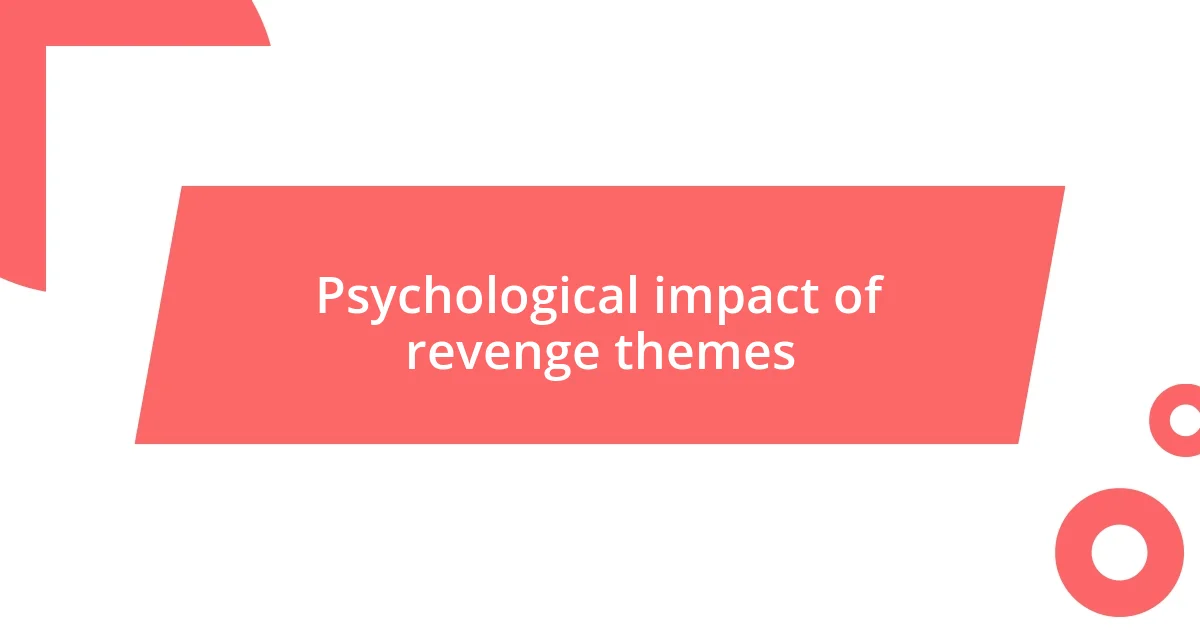
Psychological impact of revenge themes
Revenge themes can wield a profound psychological influence, often igniting a complex interplay of emotions within us. I distinctly remember binge-watching a series focused on revenge, where the main character’s turmoil mirrored my own past feelings of betrayal. It was unsettling to realize how these narratives stirred both excitement and discomfort, forcing me to confront my own moral boundaries. Sometimes, I can’t help but wonder—does indulging in such stories enhance our understanding of our own psyche, or does it only amplify our darker instincts?
As I reflected on the tangled web of emotions these stories evoke, I recognized a paradox. Many of us may find ourselves entertained by revenge plots, yet we could also be unwittingly cultivating resentment in real life. A friend once shared how reading about retribution helped her process her own feelings of anger towards an injustice she experienced. It made me contemplate whether these narratives can serve as a form of catharsis, allowing one to heal through vicarious experience. Yet, I also felt unease—could this be a slippery slope into glorifying vengeance instead of fostering forgiveness?
The psychological consequences of revenge narratives extend to the concepts of empathy and desensitization. When I analyze these stories, I see how they can desensitize us to violence and suffering. There was a time when I became too engrossed in a dark revenge thriller, and I caught myself cheering for the protagonist while completely ignoring the reality of their actions. This experience was a wake-up call; it reminded me that while revenge might be compelling fiction, it’s crucial to approach such themes with caution, understanding the potential impact on our worldview and emotional well-being.
| Aspect | Effect on Psychology |
|---|---|
| Emotional Engagement | Revenge narratives elicit strong feelings, making us question our own moral beliefs. |
| Desensitization | Prolonged exposure to revenge themes can numb our reactions to real-life violence. |
| Empowerment vs. Resentment | They can foster a sense of empowerment but may also cultivate unhealthy grudges. |
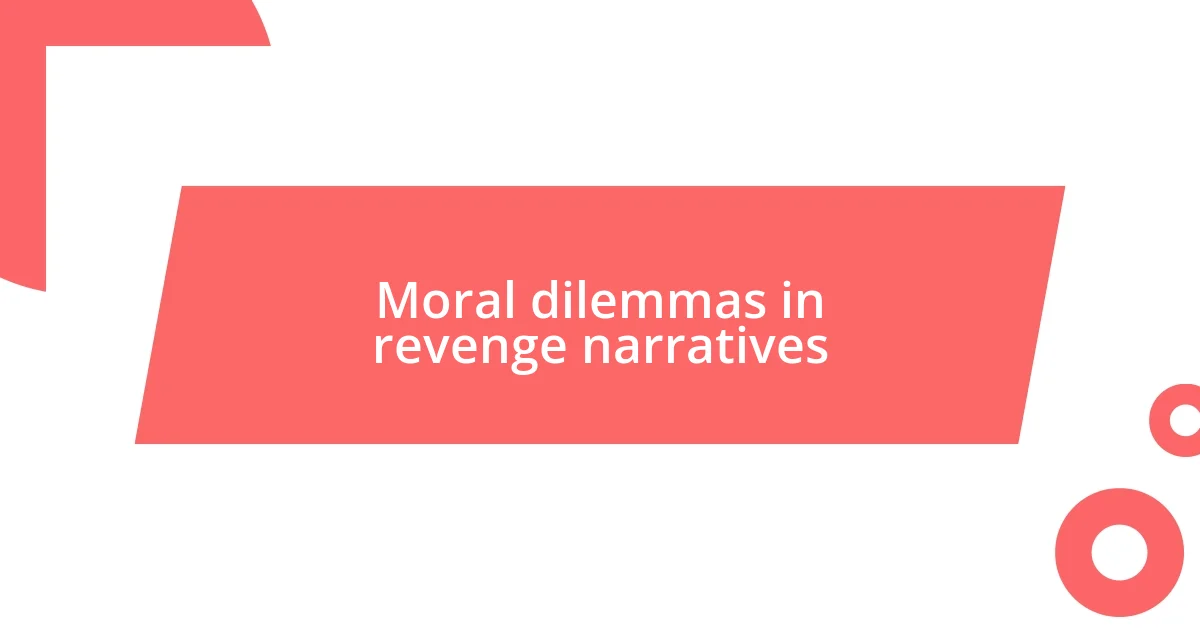
Moral dilemmas in revenge narratives
Moral dilemmas are at the heart of revenge narratives, often presenting a conflict that feels painfully relevant. I recall reading a story where the protagonist faced the choice between avenging a loved one and allowing the law to take its course. This dilemma made me question: what would I sacrifice for justice? It’s fascinating how these narratives force us to wrestle with our own values and beliefs as we ponder whether revenge truly serves justice or perpetuates a cycle of violence.
When characters teeter on the brink of revenge, the moral ambiguity is palpable. I’ve often found myself empathizing with individuals who have been wronged, rooting for their quest for vengeance. Yet, there’s an unsettling realization that sometimes, seeking retribution derails their lives entirely, corrupting their original intent. Does the pursuit of vengeance alter our moral compass? I believe it does; it can shift our focus from healing to a dangerous obsession that clouds our judgment.
Exploring these moral dilemmas also leads me to reflect on forgiveness. In one particular tale, the act of letting go became the ultimate challenge for the protagonist. It left me wondering whether true strength lies in holding onto grievances or in choosing to release them. As these narratives unfold, they invite us to explore the nuances of morality, challenging us to confront what we might deem acceptable in our own lives. Have you ever asked yourself whether you’d seek revenge if faced with betrayal? It’s a thought-provoking journey that reveals more about our character than we might wish to admit.
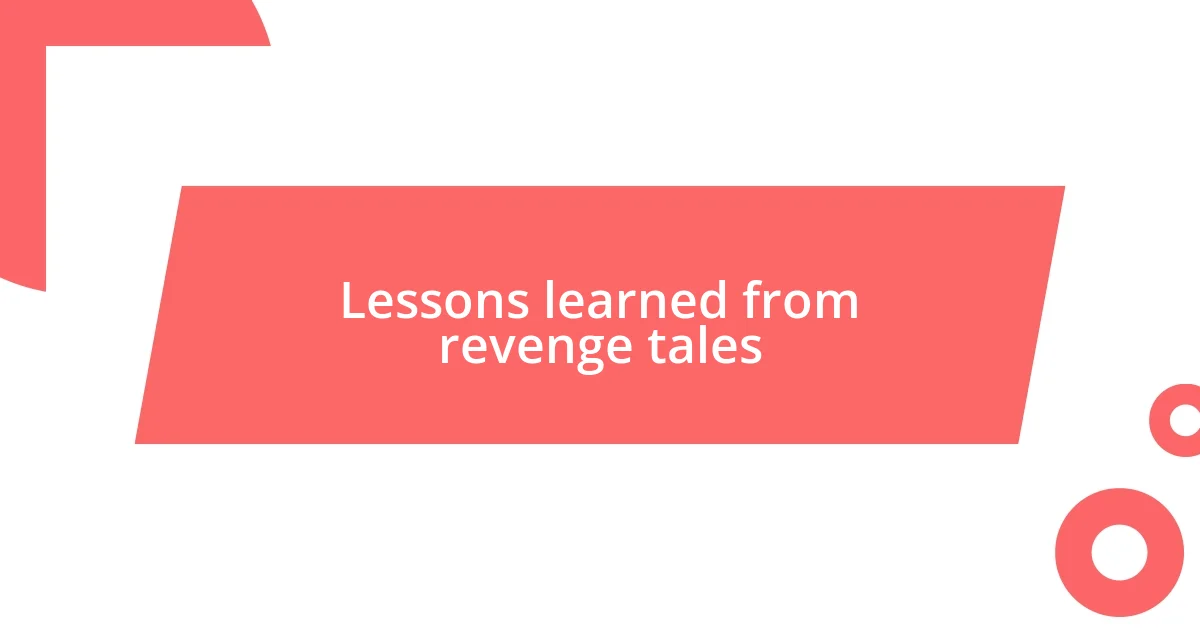
Lessons learned from revenge tales
Revenge tales often reveal a critical lesson: the cyclical nature of vengeance. I once watched a film where the lead character’s quest for retribution spiraled into chaos, harming not just her target but also her loved ones. This raised an unsettling question for me—does the pursuit of revenge truly bring closure, or does it merely prolong suffering? It’s a realization that many might grapple with, echoing the idea that two wrongs rarely make a right.
I’ve also learned that seeking revenge can cloud our judgment and distract us from the healing process. There was a time when I held onto a grudge long past its expiration date, convinced that avenging the wrong would restore my dignity. Instead, I found myself trapped in a cycle of anger and regret. From this experience, I discovered that letting go is not just an act of forgiveness; it’s a powerful reclaiming of personal peace.
Ultimately, these narratives remind us of the importance of empathy and understanding. In one particularly poignant story, the protagonist ultimately realized that understanding the motives behind their enemy’s actions could lead to a more profound resolution. It made me ponder—how often do we attempt to step into someone else’s shoes, especially those who have hurt us? Allowing ourselves that perspective could pave the way for healing, not just for us but for everyone involved.










